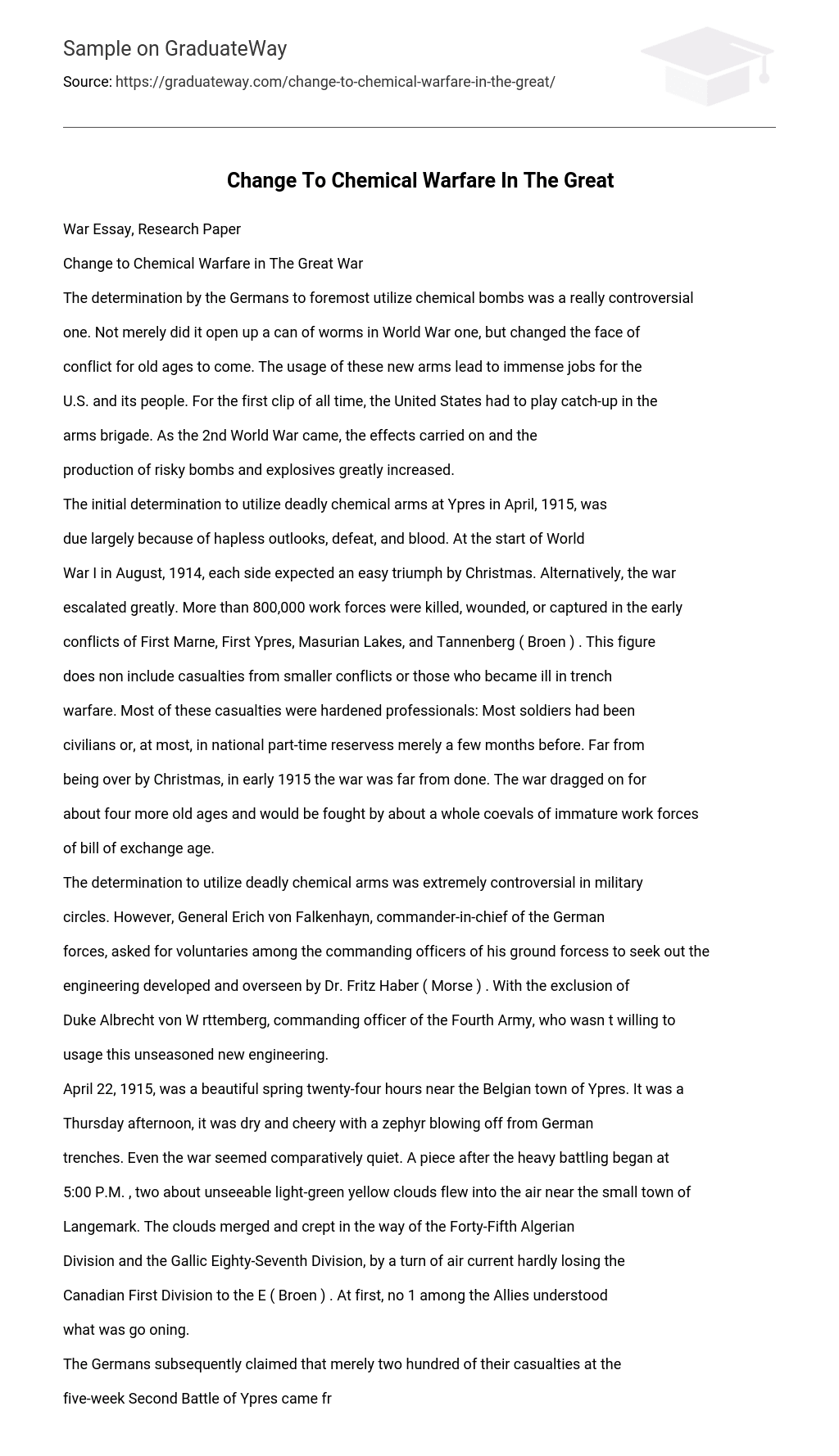The determination by the Germans to foremost utilize chemical bombs was a really controversial one. Not merely did it open up a can of worms in World War one, but changed the face of conflict for old ages to come. The usage of these new arms lead to immense jobs for the U.S. and its people. For the first clip of all time, the United States had to play catch-up in the arms brigade. As the 2nd World War came, the effects carried on and the production of risky bombs and explosives greatly increased.
The initial determination to utilize deadly chemical arms at Ypres in April, 1915, was due largely because of hapless outlooks, defeat, and blood. At the start of World War I in August, 1914, each side expected an easy triumph by Christmas. Alternatively, the war escalated greatly. More than 800,000 work forces were killed, wounded, or captured in the early conflicts of First Marne, First Ypres, Masurian Lakes, and Tannenberg ( Broen ) .
This figure does non include casualties from smaller conflicts or those who became ill in trench warfare. Most of these casualties were hardened professionals: Most soldiers had been civilians or, at most, in national part-time reservess merely a few months before. Far from being over by Christmas, in early 1915 the war was far from done. The war dragged on for about four more old ages and would be fought by about a whole coevals of immature work forces of bill of exchange age.
The determination to utilize deadly chemical arms was extremely controversial in military circles. However, General Erich von Falkenhayn, commander-in-chief of the German forces, asked for voluntaries among the commanding officers of his ground forcess to seek out the engineering developed and overseen by Dr. Fritz Haber ( Morse ) .
With the exclusion of Duke Albrecht von W rttemberg, commanding officer of the Fourth Army, who wasn t willing to usage this unseasoned new engineering. April 22, 1915, was a beautiful spring twenty-four hours near the Belgian town of Ypres. It was a Thursday afternoon, it was dry and cheery with a zephyr blowing off from German trenches. Even the war seemed comparatively quiet. A piece after the heavy battling began at 5:00 P.M. , two about unseeable light-green yellow clouds flew into the air near the small town of Langemark. The clouds merged and crept in the way of the Forty-Fifth Algerian Division and the Gallic Eighty-Seventh Division, by a turn of air current hardly losing the Canadian First Division to the E ( Broen ) .
At first, no 1 among the Allies understood what was go oning. The Germans subsequently claimed that merely two hundred of their casualties at the five-week Second Battle of Ypres came from chemical arms. The Allies said that 15 thousand of the 59 1000 casualties they suffered were a consequence of chemical arms, including five 1000 deceases. Although historiographers doubt the figures on both sides, the consequences of the first usage of modern, deadly chemical arms at Ypres made it clear that chemical warfare, even against unprotected oppositions, is both terrorizing and lifelessly but is no warrant of military triumph.
This is of import because some claim that since it is of import to hold as an ground forces, so it is all right to utilize in war even though you might non win. Chemical arms took a awful human toll over the following three and one-half old ages. Of the about 15 million casualties suffered in World War I, one million soldiers were hospitalized or killed because of exposure to chlorine, phosgene, or mustard gas ( Morse )
The fact that chemical arms are airborne, allows them to distribute beyond the battleground. This makes them unmanageable country arms, perchance harming civilians who happen to be in the incorrect topographic point at the incorrect clip. More than two thousand sum civilian casualties have been found from industrial accidents and onslaughts by the Germans. Use of chemical arms besides contributed to the eroding taking topographic point on the western forepart as a consequence of military clutters.
As General Peyton March, head of staff for the United States Army, wrote subsequently, “War is cruel at best, but the usage of an instrument of decease, which, one time launched, can non be controlled, and which may decimate noncombatants adult females and kids reduces civilisation to savagery. ”
In decision, it is clearly stated the negative effects, on the U.S. and the universe, of chemical warfare. Not merely that, but it is wholly unneeded in conflict, because the Germans used deadly elements and still lost the war. Besides in could hold an consequence on guiltless civilians who had nil to make with the war. Chemical warfare has physical effects on one s organic structure and psychological effects from being through these awful conflicts.
Bibliography
- Britanica Online. World War I. 1997
- Broen, Anthony. The Great War. New York: Bantam, 1979.
- Cheney, Glenn Alan. Weapons of WWI. London: Franklin Watts, 1983.
- Gale Group, The. Germany First Uses Lethal Chemical Weapons on the Western Front World History. . 1994
- Morse, Joseph Laffan. World War I. Funk & A; Wagnalls Encyclopedia. 1967 erectile dysfunction.





